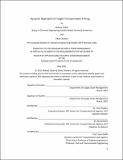| dc.description.abstract | The tender acceptance rate significantly decreased between 2019 and 2021 for our capstone sponsor, Aqua Deal, a bottled beverage manufacturer. This poor primary carrier performance led to increased use of the spot market, higher transportation costs, and lower carrier service levels for Aqua Deal. In addition, during the COVID-19 pandemic, the truckload industry entered a tight market, where demand for trucking services outweighed the available market supply. This led to an increase in transportation costs and reduced tender acceptance rates for Aqua Deal. To address this issue, we explored the use of Index Linked Freight Contracts (ILFC). The purpose of ILFCs is to increase carrier acceptance by dynamically adjusting prices using an index. Using transactional data from 2019 to 2021, which covered both soft and tight markets, we built a logistic regression model to simulate potential carrier acceptance rate given price adjustment. The model predicted a 2% improvement in carrier acceptance but with a 4% increase in costs. We also explored other paths to increase carrier acceptance such as to avoid rushed shipments whenever possible. | en_US |
